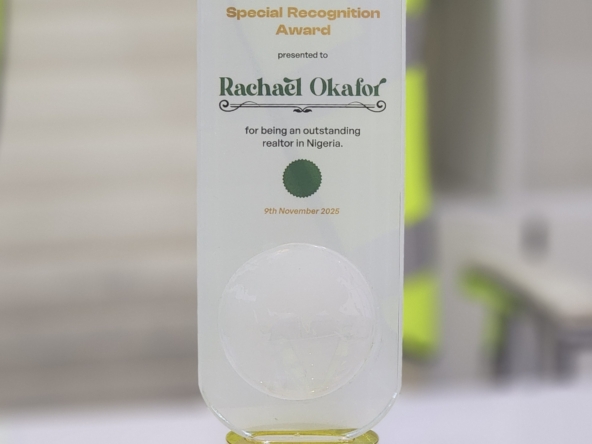Fraud in property sales is no longer an occasional horror story. It has evolved into a systemic risk buyers face every day ranging between inaccurate online listings, fake titles, multiple sales of the same plot, and even organized syndicates who sell land that doesn’t exist. Recent industry research found that well over half of property listings in Nigeria do not match reality, and enforcement agencies are actively arresting fake vendors.
Most of these scams are easily avoidable if you know what to look out for. So here are what the common scams look like, and how you can protect against these scams.
The Common Scams You’ll See In Lagos
1. Fake Title Documents
One of the most dangerous and financially devastating traps in the Lagos real estate market is the proliferation of fake title documents, a scheme that has become increasingly sophisticated as property values rise. These falsified papers are designed to deceive unsuspecting buyers into believing that a seller holds legitimate ownership rights, when in reality, the land or property is either under government acquisition, belongs to someone else entirely, or does not legally exist in the form presented. What makes this form of fraud particularly destructive is the false confidence it gives buyers. A well-presented document, laminated, stamped, or even bearing what appears to be an official seal can instantly lower a buyer’s guard, especially when accompanied by persuasive agents or developers who appear experienced and reputable.
The most commonly forged document is the Certificate of Occupancy (C of O), arguably the most valuable title in Lagos. Fraudsters frequently recreate scanned copies of old or existing C of Os, manipulate signatures, alter names, and duplicate file numbers, producing documents that look authentic to the untrained eye. Some go as far as referencing real allocation numbers or mimicking the exact design elements of Lagos State documents. In these cases, only a verification search at the Land Registry can reveal the truth, as visual inspection alone is no longer reliable. The same types of forgery occur with Governor’s Consents, where scammers present doctored approval pages or fake acknowledgment receipts, claiming that the process is “in progress.” Buyers who fail to verify directly with the Land Bureau often fall victim to these tactics, believing the transaction is legitimate simply because the paper appears official.
Survey plans are also frequently manipulated, often in ways that buyers do not easily detect. A scammer may take a genuine survey plan, change the name, alter the coordinates, and re-stamp it with a forged seal. The real danger here is that an altered survey can mislead a buyer into purchasing land that is not free from acquisition or that lies in a completely different location from what was advertised. Many victims only discover the truth after attempting to build or process their own documents, at which point government mapping systems reveal that the survey does not correspond with the plot they bought. These revelations often come too late, after millions have been spent.
What makes the situation even more complicated is that the fraudsters involved in producing fake documents do not always operate in isolation. Some leverage insider knowledge or enlist individuals who previously worked within documentation departments and understand government formatting. They know how to mimic the language, stamps, and layout of official documents in ways that make even experienced buyers second-guess themselves. Coupled with emotional pressure, such as insisting that the property is in “high demand,” offering discounted prices for fast payment, or claiming that the seller is “relocating urgently,” buyers find themselves rushing into agreements without independent verification.
The consequences of falling for fake title documents are severe. In Lagos, the government does not honour documents it did not issue or approve, regardless of how authentic they appear. This means a buyer can lose both the money paid and the land they believed they purchased. The legal battles that follow are often time-consuming, expensive, and emotionally draining, with no guarantee of recovery. In extreme cases, properties sitting on falsified titles may be demolished during government enforcement operations, leaving the buyer with nothing but regret and debt.
The only true confirmation of authenticity comes from conducting searches directly through the Lagos State Land Registry and the Office of the Surveyor-General. Relying on trust, appearance, or the confidence of an agent is never enough. Legal review is equally crucial, as trained real estate lawyers can identify red flags in formatting, filing references, and the chain of title that non-professionals often overlook. For many buyers, the safest route is to work with reputable and established property brokers or agencies that maintain their own internal verification processes and avoid listing properties without proper due diligence.
2. Double Selling/ Selling The Same Properties to Multiple People
Another increasingly rampant issue in the Lagos property market is multiple sales, often referred to as double-selling, a fraudulent practice where the same plot of land is sold to two or more unsuspecting buyers. This scam has become one of the most emotionally and financially devastating experiences for property investors, particularly first-time buyers who may not fully understand the verification processes needed to confirm rightful ownership. The mechanics of the fraud are deceptively simple: an unscrupulous seller collects deposits or full payments from several buyers, often within a short timeframe, then disappears or becomes unreachable once the victims begin to discover each other.
What makes multiple-selling so widespread in Lagos is the combination of high demand, fragmented documentation processes, and the involvement of unregulated middlemen. Some sellers intentionally exploit buyers’ urgency especially in fast-developing corridors where land prices rise quickly and buyers are eager to “secure a plot before prices go up.” In many cases, a buyer is shown a clean plot, a promising layout map, or even a partially fenced estate, all of which create the illusion of legitimacy. The seller may appear credible, present neatly printed documents, or work through polished agents who seem professional. Buyers, believing they have found a great opportunity, rush to pay deposits without conducting deep due diligence.
The most dangerous aspect of double-selling is that it can occur at different levels of the market. At the informal level, family land (often called “Omonile land”) is particularly risky because multiple family representatives may claim authority to sell the land. One branch of the family may sell to you today, while another sells to someone else tomorrow, each presenting their own “valid” receipts. Buyers often discover the truth only when rival owners show up on-site, sometimes leading to disputes, confrontations, or forced halts in construction. At the developer level, some poorly regulated or unethical estate companies oversell allocated plots, promising more plots than the land can physically accommodate, banking on the fact that not all buyers will try to take possession immediately. This creates chaos when multiple owners eventually attempt to take possession of the same plot years later.
Another reason multiple-selling persists is that many buyers fail to insist on conducting a proper title investigation. Even when a seller provides survey plans, allocation letters, or excision documents, those papers may belong to a different section of the estate or a different plot entirely. Without a proper charting search at the Office of the Surveyor-General or a title search at the Land Registry, a buyer cannot truly know whether the land exists in the form advertised or whether previous transactions have already been recorded on that plot. Fraudsters rely heavily on the fact that most buyers, especially diaspora buyers, are unable to verify these details personally and are instead forced to depend on the seller’s representations, which can be dangerously misleading.
The consequences of double-selling are severe and often traumatic. Buyers who have poured their life savings into a piece of land suddenly find themselves entangled in disputes, legal battles, or efforts to recover funds from a seller who has long disappeared. In some extreme cases, competing buyers may attempt to take possession simultaneously, leading to confrontations or police involvement. Because possession and documentation determine ownership in Lagos, the first buyer to secure proper approvals or legally take possession often gains the advantage, while others must fight for refunds that may never come.
Avoiding multiple-selling demands structured due diligence. Buyers must verify ownership through the Land Registry, confirm survey coordinates with the Surveyor-General’s office, and ensure the seller has clear legal authority to transfer ownership. Working with reputable real estate brokers or registered developers significantly reduces the risk because established firms have internal processes designed to detect inconsistencies before listing a property for sale. Lawyers also play a crucial role, as they can identify whether the seller truly holds title, whether the transaction has previous entries, or whether the land has been involved in litigation.
3. Omonile / Community Sales Without Excision
Another major source of property disputes in Lagos stems from Omonile or community land sales carried out without proper excision or statutory approvals. In many parts of the state, especially in fast-developing outskirts, large areas of land are originally under government acquisition. When such land has not been officially excised or released back to the community, the traditional family or local landowners technically lack the legal authority to sell it. Yet, many buyers, eager to “buy before prices go up,” rush into these informal transactions, believing that ancestral ownership automatically confers legitimacy. In reality, it does not. A land that has not been excised remains, in the eyes of the law, government land, and government land cannot be privately owned, no matter how many community receipts or agreements accompany the sale.
This creates enormous risks. A buyer may purchase a plot today, build on it tomorrow, and still wake up to a government demolition notice years later because the land was never legally released. Even more troubling is the issue of multiple claims. Community lands often involve several branches of the same family, each claiming rights over the land. One faction may sell to a buyer in the morning, while another faction sells the same land to someone else in the afternoon, each issuing their own receipts and signing contradictory agreements. The result is bitter disputes, court cases, and endless attempts at mediation, none of which help the buyer who simply wanted peace of mind. Without excision, survey authentication, and a proper title process, buying Omonile land remains one of the most precarious transactions in Lagos, no matter how convincing or deeply rooted the sellers appear to be.
4. Impersonation and Identity Fraud
Another sophisticated and increasingly common scheme in Lagos real estate involves impersonation and identity fraud. Here, scammers pose as either the property owner or the official agent, armed with forged identification cards, fabricated letters of authorization, and sometimes even social media accounts or WhatsApp chats that appear legitimate. These impostors exploit the fact that many buyers never meet the true property owner physically, especially in cases where the seller lives abroad, is an elderly person, or is represented by an agent. The fraudster creates an elaborate backstory, often claiming the property must be sold urgently, using emotional triggers such as relocation, medical emergencies, or financial distress to pressure the buyer into paying quickly.
This type of fraud is particularly dangerous because the scammer often has access to partial or outdated information about the property, making their narrative seem credible. They may present copies of real documents stolen from earlier transactions or extracted from old listings online. Some even conduct site inspections with buyers to make their story more convincing. Once the payment is made, the impersonator vanishes, and the real owner later emerges with no knowledge of the sale, and no legal obligation to honour it. In such situations, the buyer’s money is gone, the property remains legally untouched, and the fight to recover funds becomes almost impossible. This kind of fraud thrives in a market where urgency and trust override verification. Without direct confirmation from the true owner, cross-checking identification, and legal validation, impersonation scams will continue to catch even the most well-intentioned buyers off guard.
5. Non-Existent Developments and Off-Plan Ghost Projects
A particularly heartbreaking and financially ruinous scheme affecting many buyers today is the issue of non-existent developments, off-plan projects marketed aggressively by developers who either lack the financial capacity to build or never intended to develop anything at all. Lagos’ booming housing demand has encouraged hundreds of new real estate companies to enter the market, not all of whom have the credibility or structure to deliver on their promises. These companies launch glossy marketing campaigns, showcase beautifully rendered 3D models, organize elaborate site tours on empty land, and offer attractive payment plans that make the deals seem irresistible. Buyers make deposits and begin installment payments under the assumption that construction will begin within a stipulated timeframe. Yet, months and sometimes years pass without any progress on the site.
In the worst cases, the developer disappears altogether, and the “estate” turns out to be nothing more than a branding exercise for land they do not own or cannot legally develop. In other situations, the developer remains operational but is financially insolvent, meaning they rely entirely on new buyers’ funds to attempt construction, a practice that collapses as soon as sales slow down. This leaves hundreds of buyers stranded, each with partial payments made toward houses that will never materialize. Off-plan scams persist because many buyers are drawn to the promise of affordability, flexible payment plans, and the dream of owning a modern home in a rapidly developing corridor. Without due diligence into the developer’s history, delivery track record, financial stability, and actual rights to the land, the risk of paying for a project that never gets built remains alarmingly high.
Practical Steps to Avoid Real Estate Scams In Lagos
- Start with public records and verify the title at the registry
- Check building approvals and compliance online
- Insist on professional survey and land search
- Verify the seller and the agent
- Always visit the site in person (or get someone you trust to do so for you)
- Don’t pay cash into personal accounts, use escrow or lawyer trust accounts
- Use legal counsel experienced in property
- Do an online safety check on listings and images
- Ask for a history of the title (chain of ownership)
- Walk away if pressure tactics start
How Trusted Brokers (like Geoponts) Add Value
Working with a credible agency doesn’t remove risk, but it reduces it dramatically. Trusted firms do the heavy lifting, We at Geoponts Properties will:
- pre-verify documents before showing the property
- coordinate surveys, registry searches and title perfection
- negotiate escrow and lawyer mechanisms for secure payments
- provide after-sales support for registration and title perfection
We combine local market knowledge with rigorous verification: every listing is checked for title clarity, approvals and delivery status before it is introduced to buyers. We also work with lawyers and surveyors you can trust because peace of mind is part of the product.
Fraudsters rely on speed, secrecy and scarcity. Your powerful countermeasures are patience, verification and professional help because sometimes speed and efficiency is important in a Market like Lagos where the demand makes good deals spend less time on the market, which is why you need a broker like Geoponts Properties with the experience to move fast and move safe in helping you close that deal with proper due diligence. Before you transfer money, make sure you have checked the registry, confirmed approvals, verified the seller, and used escrow. Simple, disciplined steps protect capital and preserve opportunity.
If you want help navigating Lagos’ property market with rigor and confidence, Geoponts Properties Ltd can guide you through the checks, paperwork and negotiations so your next purchase is an asset not a risk.
📍 Visit Us: 781 Somide Odunjinrin Avenue, Omole Phase 2, Ikeja.
📞 Call/WhatsApp: 08084410146 | 07063557501
📩 Email: geopontsproperties@gmail.com
🌐 www.geopontsproperties.com
📱 Instagram: https://www.instagram.com/geopontspropertiesltd




